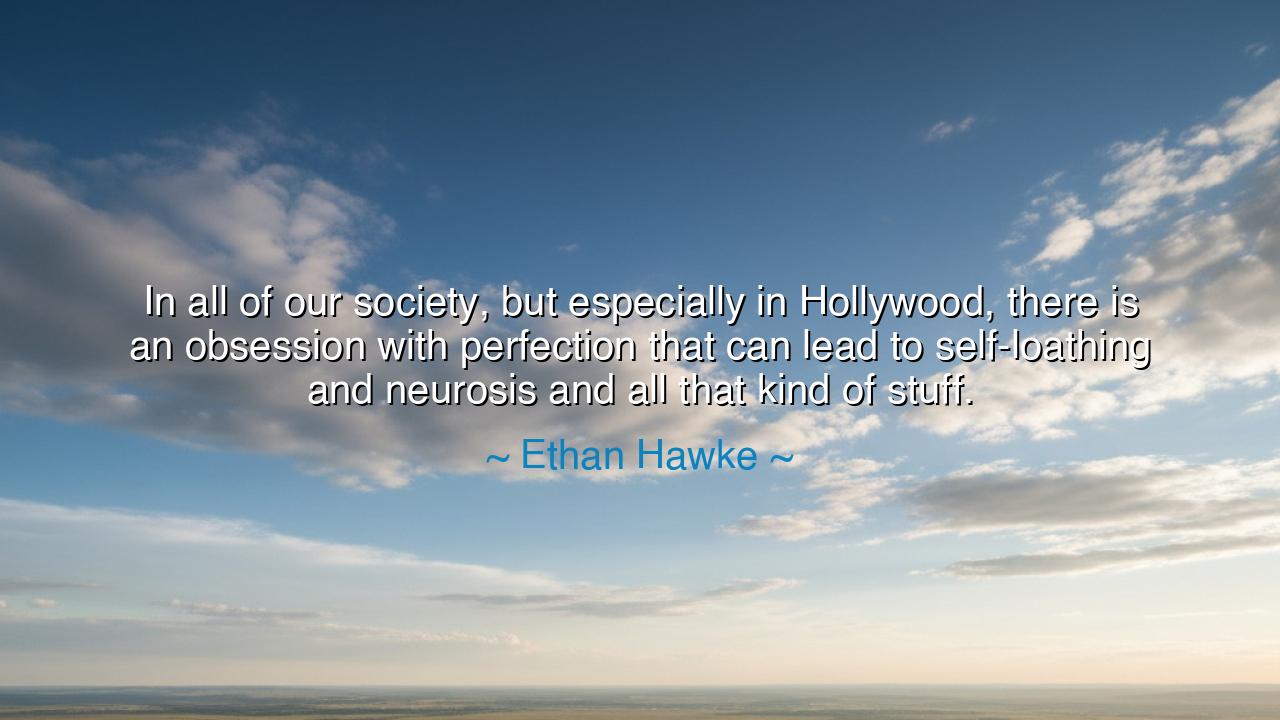
In all of our society, but especially in Hollywood, there is an
In all of our society, but especially in Hollywood, there is an obsession with perfection that can lead to self-loathing and neurosis and all that kind of stuff.






Hear, O listeners, the voice of Ethan Hawke, who, having walked the path of the stage and the screen, spoke with candor about the burden he has witnessed: “In all of our society, but especially in Hollywood, there is an obsession with perfection that can lead to self-loathing and neurosis and all that kind of stuff.” These words, though spoken of actors and artists, strike at the heart of all humanity, for they reveal the danger of worshiping an illusion that no mortal can truly attain.
For what is this obsession with perfection? It is the endless striving to appear flawless, to erase every wrinkle, to silence every weakness, to chase an image that exists not in reality but in the imagination of a restless world. In Hollywood, this pursuit is magnified, for the cameras never sleep, the magazines never rest, and the gaze of millions falls heavily upon the shoulders of a few. Yet Hawke tells us plainly: such a pursuit does not bring peace, but self-loathing, despair, and the slow disintegration of the soul.
History has told this tale before. Consider the great empire of Rome, where emperors adorned themselves in gold and marble, seeking to appear godlike before their people. Yet behind the palaces, madness often lurked, for the demand to seem perfect in strength, beauty, and wisdom drove many to cruelty and paranoia. Nero, Caligula, Commodus—these names remind us that the mask of perfection often hides a tortured spirit. And so too, in our age, the faces we see in glamour may conceal a heart weary of its own disguise.
Nor is this struggle limited to Hollywood alone. In every corner of society, people compare themselves to images crafted by others, forgetting that life is not meant to be perfect but real. The young are told their worth lies in their appearance; the worker is told he must always succeed; the mother is told she must never falter. Such burdens break the human spirit, for they deny the truth that imperfection is not weakness but the very fabric of our shared humanity.
Hawke’s words shine as both warning and invitation. The warning is this: if we continue to chase this illusion of flawless beauty and flawless living, we shall reap only emptiness. The invitation is to step away from false mirrors and to embrace the honesty of being. For the artist is not great because he is perfect, but because he is vulnerable, because he reveals his wounds and flaws and in doing so touches the hearts of others.
The lesson, O seekers of wisdom, is to abandon the idol of perfection. Do not measure yourself against images that were never real. Instead, embrace the cracks in your soul, for it is through them that light shines. Love your imperfections, and love the imperfections of others, for in them you will find truth, beauty, and connection. In your homes, your work, your friendships, let authenticity be honored above appearances.
Therefore, take this teaching into your daily life: when you feel the weight of comparison, remind yourself that even the stars are not flawless, yet they shine. When you are tempted to despise your reflection, remember that the truest beauty is compassion, kindness, and courage, not the fleeting image of a screen. And when you look upon others, see not the masks they wear, but the humanity they carry.
Thus remember Hawke’s wisdom: an obsession with perfection leads only to chains, but the embrace of imperfection leads to freedom. Teach this to your children, live it in your actions, and you shall find a joy that no glamour can provide—a joy rooted not in illusions, but in the eternal truth of being fully, beautifully human.






AAdministratorAdministrator
Welcome, honored guests. Please leave a comment, we will respond soon